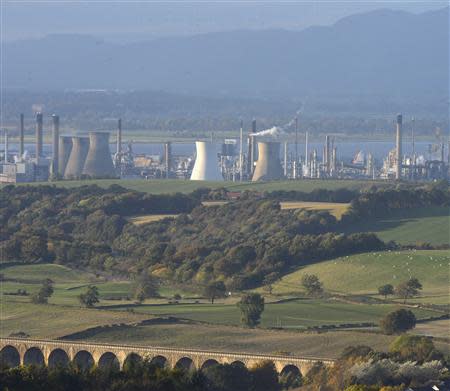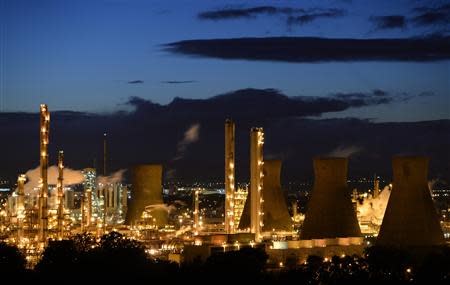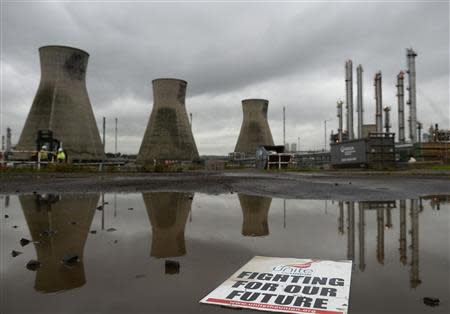Union accepts Ineos demands to avert Grangemouth's closure
By Alexander Winning and Simon Falush LONDON (Reuters) - Britain may avert the closure of the Grangemouth refinery and petrochemical plant after union leaders said on Thursday they had accepted demands from the management in an effort to save 1,400 jobs. Scottish government officials met union leaders and management at Grangemouth on Thursday in hopes of persuading the operator, Swiss-based chemicals group Ineos, to re-open the plant, the largest industrial site in Scotland and its only refinery. "The unions have indicated to the company that in terms of their survival plan we have put forward our positive response to that," Len McCluskey, general secretary of the Unite union, told the BBC. Ineos halted production last week at the 210,000 barrels-per-day refinery, which provides 70 percent of Scotland's fuel, due to the dispute with Unite, Britain's largest union. Unite had initially encouraged members to reject the company's plan to cut pension provisions and freeze pay, moves Ineos considers vital to a plan to stem losses at the plant. The company has yet to respond to the union's latest stance. Ineos, which says the combined site makes a loss, promised to close the petrochemical plant, which employs 800 people, earlier this week and said it was still deciding on the future of the oil refinery. It made the decision despite opposition from British Prime Minister David Cameron, who had called for talks to continue. REFERENDUM The proposed closure is a potential setback for the Scottish National Party, which is leading a campaign for Scottish independence ahead of a referendum next year, in which the strength of the economy and oil industry will be central issues. Scottish authorities have said they will not allow the plant to close and have been looking for potential buyers for the plants, which help support many other jobs in the area. British government sources said that although Grangemouth was one of the best-configured refineries in the UK, producing large quantities of diesel and jet fuel as well as gasoline, it would be difficult for any new investor to turn the plant around. "There is a possibility of a future for Grangemouth, ... but it would be quite a challenge for anyone looking at it," said one of the sources, who wished to remain anonymous. Many analysts question whether refineries in Europe, which are mainly geared towards producing gasoline, can compete in the longer term against competition from other regions. Westminster has developed contingency plans should the plant close. Fuel supplies to Scotland and Northern England would not be affected, the source added. Another British government source said officials were holding ministerial discussions with PetroChina, which owns 49.9 percent of the Grangemouth refinery. "We are obviously keen to understand their position," the source said, without elaborating on whether the discussions concerned the Chinese oil giant buying the refinery outright. Ineos owns all of the petrochemical plant and just over half of the refinery. Apart from threatening to disrupt fuel supplies, the Grangemouth dispute also unnerved international oil markets because the refinery generates steam that powers the Kinneil oil plant, which processes North Sea crude oil grade Forties. But the British government official said that Forties oil flows would soon become independent of Grangemouth, as a new power source for Kinneil would come online shortly. (Additional reporting by Dmitry Zhdannikov; editing by Anthony Barker)

 Yahoo News
Yahoo News 






